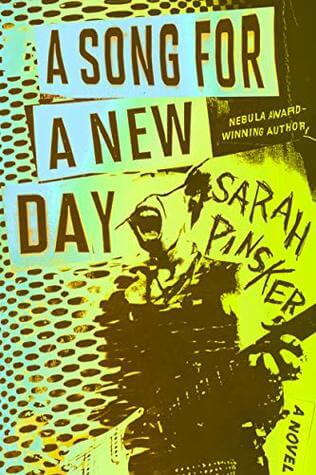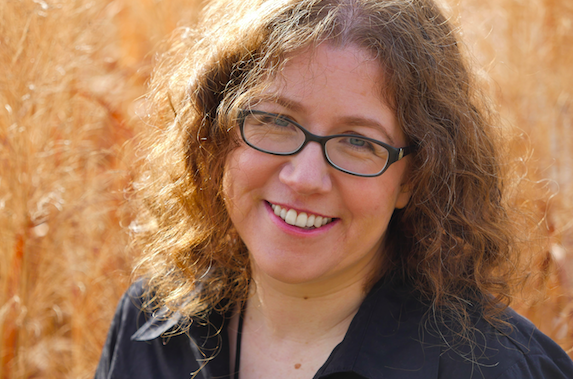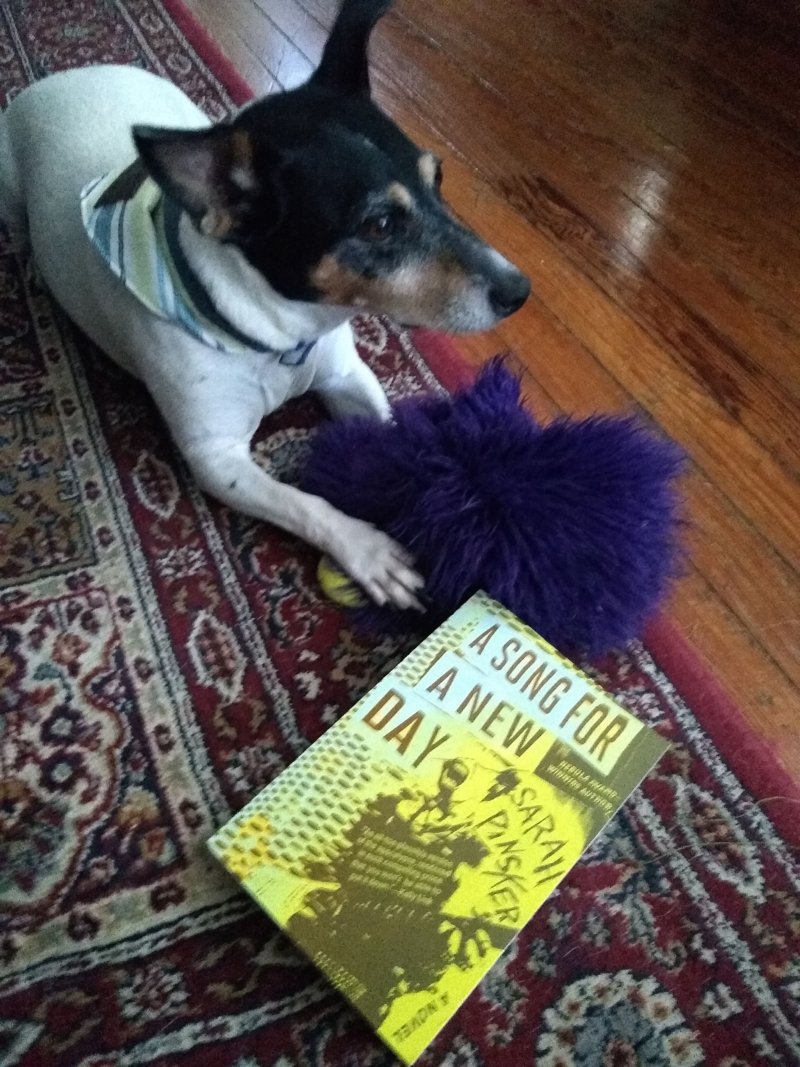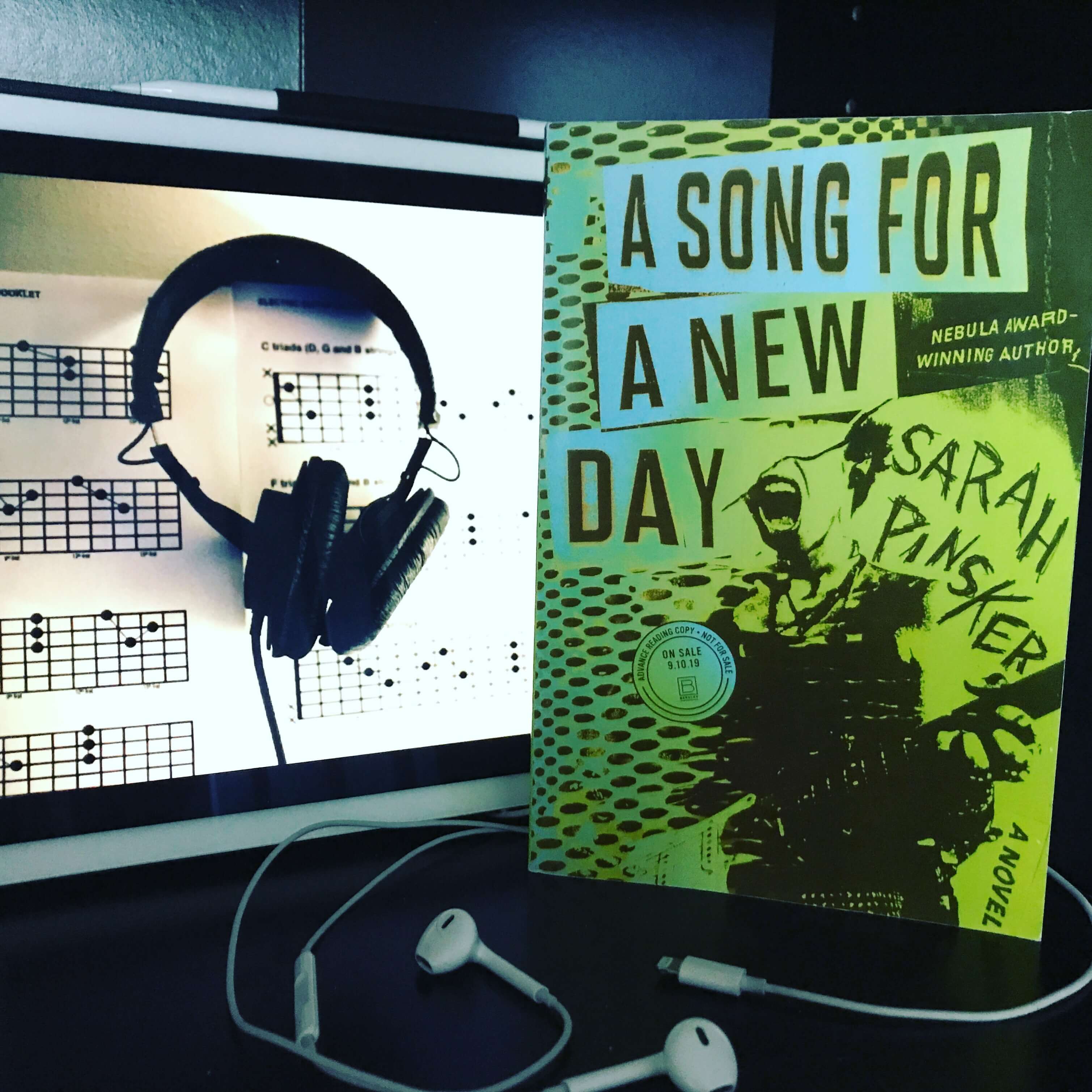

I recently shared my thoughts about A Song for A New Day, and now it is time for the much awaited interview with Sarah Pinsker. She is also the author of the novelette “Our Lady of the Open Road,” winner of the Nebula Award in 2016. Her novelette “In Joy, Knowing the Abyss Behind,” was the Sturgeon Award winner in 2014 and a Nebula finalist for 2013. If leafing through digital magazines like Asimov’s, Fantasy & Science Fiction, Daily Science Fiction, is a guilt pleasure of yours, then you have likely read some of her work there! Sarah is also a singer/songwriter with three albums on various independent labels (the third with her rock band, the Stalking Horses) and a fourth forthcoming.
It was wonderful to connect with Sarah about her book and music! The best part was learning about some developments in the music industry that I had not been aware of. What feels like novelties right now, A Song for A New Day makes them into realities for everyone, as a widely-known fact. Hope you learn something new through this interview as well! Enjoy! 🙂
- Your novelette, Our Lady of the Open Road won the Nebula Award in 2016 and features Luce, the main character of A Song for A New Day as well, after she has met Silva. Could the events of Our Last of the Open Road be considered part of A Song for A New Day?
They both still hopefully stand alone without each other; I think of them as companions more than parts of each other. I also have two other stories set in the world: “A Song Transmuted,” which features one of the side characters, first appeared in the Cyber World anthology, and was reprinted in Sunspot Jungle and A Punk Rock Future, and “Everything is Closed Today,” in I Will Not Go Quietly, featuring mostly different characters but a cameo from Joni as a child.
- How similar are you as a person to Luce? How have your experiences differed from her in the Before?
It’s hard to say from the inside. There are similarities, but she is definitely not me. My childhood was nothing like hers. I gave her a level of on-stage star power that I don’t think I have; the fun was in writing someone who is a different kind of performer than I am. I gave her some of my touring experiences, and I think her reactions to problems may be similar to mine. We’re both reluctant to jump into new experiences.
- “Just because something had needed improvement didn’t mean the solution was to cancel it entirely.” This is one of my favorite quotes from the book, because it not only speaks about industries, but also individual habits that we cultivate and then give up. Are there currently parts of the music and writing industry that need improvement to survive?
There are always things that need improvement. On both fronts, we need to get better about paying artists, and about paying everyone involved in creation, and we as consumers need to get better about paying for art when we can. Buying direct from artists or from indie stores keeps money in your community, but it’s so tempting to buy from the online behemoths when they undercut prices.
Writing pay seems in some ways more reliable than music pay, at least at low levels where you’re at the mercy of clubs’ dicey payment methods. I think publishing has a long way to go in terms of representation of marginalized voices, though I do think the industry is getting somewhat better about at least recognizing that there is a market for those stories.

- One of the things I love about dystopias is that they provide a glimpse into a possible future, almost preparing us for something that we know can likely come true. What factors led you to reimagine how the music industry is today?
We’re already at a point where bands are competing with your couch and your shows and the internet, and where people are becoming accustomed to not paying for music. CDs were easy to carry to shows, and people bought them and CDs and T-shirts helped cover a band’s next meal or gas to the next town even when the take at the door was split.
They are experimenting with holograms that can do shows, so the next question is if people will take a chance on going to see a live local band if they have a chance to see David Bowie or Prince in hologram. There are already VR concerts, and I once saw an Imax 3D concert that was utterly amazing. It felt like I was sitting on stage. I could see the settings on the amps and everything on the set list. Like having the best seat in the house, without being crowded. I saw that show and thought “I can see how people would go for this instead of trying to park and stand in a club all night.” So everything on the music side felt very true to me.
- What is your first memory of interacting with music, whether making it, or listening to it? What suggestions would you give to someone who wants to learn to play a musical instrument?
Nobody’s asked me that one before! Hmm. Probably my two earliest music memories are putting “Puff the Magic Dragon” on my parents’ record player and listening to the lyrics and thinking it was the saddest thing I’d ever heard, and listening to my mother’s favorite Kinks album, State of Confusion, as she drove my first grade carpool. I can still sing that whole album by heart.
In terms of learning to play an instrument, I think sometimes it takes time to find the right instrument for you. I was TERRIBLE at wind instruments. Piano lessons helped me learn some things about music theory, but it wasn’t until I had a guitar in my hands that everything clicked. Oh! And I guess my other advice would be that if you want to be in a band, learn to play bass. Everyone is always looking for a bass player.

- What is on your playlist right now?
The new Brittany Howard album, and also her second band Thunderbitch. Local-to-me bands Manners Manners and Santa Librada.
- Did your love for music come before or after becoming a writer? What made you decide to mesh these two together in your stories, along with some science fiction and fantasy elements? How have these different aspects of you helped you evolve?
I can’t remember life without either, to be honest. I’ve always loved music and I’ve always loved writing stories. After college, when I started looking toward a career in music, I put away the fiction for a while. I didn’t feel like I was saying anything unique there. When I came back to it after years of writing only music, years in which I went to new places and played and took interesting jobs and met a lot of people, I found a voice that I think I hadn’t had before. I had a better sense of the rhythms of language, from songwriting, and I had new stories to tell, in areas that not a whole lot of people seemed to have traveled.
- For someone like me who loved your book, what would you recommend we read next?
Hmmm…it depends on what you loved about it! If you like the rebellion and punk aspects, check out Annalee Newitz’s Future of Another Timeline. If you like the music, try Elizabeth Hand’s Wylding Hall. Oh, hmm, and I guess if you just like it in general, you could also try my collection of short fiction, Sooner or Later Everything Falls Into the Sea, which was published by Small Beer Press in March.
- Are there any books/stories that you would say influenced and shaped you as a writer?
So many! Too many to list. I read a lot of short fiction, so I’d say the short fiction of Ursula K. Le Guin and Karen Joy Fowler and Octavia Butler and Theodore Sturgeon was very influential. Kathe Koja’s novel Skin was an influence on my writing about music, even though it’s about performance art and sculpture; that’s probably the most successful novel about another art I’ve ever read.
- What would you tell your younger self when it comes to writing?
Finish stories! My younger self loved writing, but was terrible at finishing stories. If I could give her advice on looking through the beginning and middle to recognize a possible ending to write toward, she’d probably have finished more. But I was also lazier then, and I think I needed to mature a little to be able to finish more stories.

** A Song for A New Day is now out in stores so get a copy and let me know what you think! **
Amazon Print
Amazon Kindle
Cover image: Photo by Vishnu R Nair on Unsplash
Photo of grey and black PA speakers near electric guitar by Austin Neill on Unsplash
Sarah’s bio can be found here.

Be First to Comment